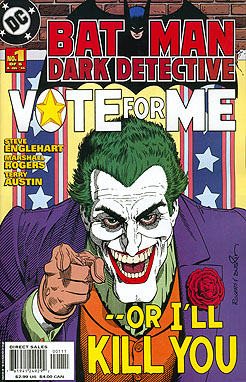Monday, May 16, 2005
Sad Spirits of '77?
Okay, so what does this:

have in common with this:
 ?
?Well, on the most basic level, they each represent a pop-culture creator (creators in the case of the comic book) returning to the scene of, arguably, his greatest triumph. In 1977, George Lucas gave the world Star Wars and the rest was history. That same year, a comic book writer, named Steve Englehart, defected from Marvel to DC, and teamed up with a then-unknown penciller named Marshall Rogers to create what has been called the "definitive run" of Batman stories. Frank Miller's The Dark Knight Returns also can claim that boast, but it should be recalled that Miller's stories were intentionally set in a not-too-distant future, allowing Miller to take some risks and do some things that couldn't be managed in present-day tales. The Englehart/Rogers series was contemporary while also being retro, intentionally paying homage to the dark styles and characterizations of the '40s -- while also introducing the most "adult" love interest Bruce Wayne/Batman has ever had -- Silver St. Cloud. Silver was the first woman to figure out Bruce and Batman were one and the same. The scenes between the two had an intimate subtext unusual for a mainstream, Comics-Code approved title. Anyway, at the conclusion of the eight-issue sequence, Silver left Batman, deciding she couldn't deal with a man who led a double-life (as if no other woman has had to deal with that).
Englehart also departed with that scene (with Rogers following a few issues later), leaving fans begging for more. They finally returned this year with Batman: Dark Detective -- a sequel nearly 30 years in the making. The first issue, above, came out two weeks ago; the second follows this week.
The return is interesting, if not somewhat problematic, but I'll leave an aesthetic review of it for another time.
What I want to talk about now is its politics which is the main thing it has in common with Lucas' latest. Now, don't get me wrong --- even though the plot of the first issue revolves around the returned Silver St. Cloud's fiance running for governor and the Joker deciding that if he himself is not elected governor, he'll kill everybody, politics isn't the main point of the book.
However, what is one to make of this line uttered by arch-villian The Joker: "Now you may say, 'But, Joker, we know you're a homicidal maniac, and it's the maniac that concerns. Can we rely on you?' And I say to you, my friends, that if the presidency doesn't have to be on speaking terms with reality, still less does the governorcy..."
Um, well, that seems like a real cheap-shot at George W. Bush, now doesn't it? Maybe, I'm being too sensitive. It's not as if every line goes after Bush in such a manner, but this came so much out of the blue, that it seems out of place. Particularly, given that it doesn't really make sense -- how is anyone supposed to 'take seriously' anything coming from the mouth of an admittedly self-described "homicidal maniac"? But, then again, there's a long literary tradition of the "true" statements coming out of of the mouth of the "court jester."
What does this have to do with Revenge of The Sith?
Well, as Page Six noted this weekend, the finale of Lucas' saga (or is Return of the Jedi actually the finale?), seems replete with cheap jabs at the contemporary Bush administration (full disclosure -- I haven't seen the movie yet):
It's hard not to feel that Lucas' engagement with this story has a contemporary urgency, as line after pointed line invites us to see a parallel with today's wartime climate," [Newsweek's David] Ansen writes. " As the Senate cedes power to Palpatine under the guise of intergalactic security, Natalie Portman's Princess Padme exclaims bitterly, 'So this is how liberty dies - to thunderous applause.'"In another much-cited scene, Ewan McGregor's Obi-Wan Kenobi declares, "Only a Sith Lord deals in absolutes," after Hayden Christensen's Anakin Skywalker says, "If you're not with me, you're my enemy," an obvious reference to Bush's statements regarding the war on terror.
There's nothing wrong with allowing contemporary events to influence one's art. Indeed, prior to his first work on Batman, Englehart was responsible for a much praised mid-70s run on Captain America. In that storyline, the "sentinel of liberty" battled an organized paramilitary crime organization called The Secret Empire. The conclusion revealed that The Secret Empire was directly controlled by the Nixon White House (though the president was not explicitly named). But, as Englehart himself as noted, when one is writing a book called Captain America, the political and social tenor of the time should be part of the broader storyline. Heck, the character was created just months before Pearl Harbor.
Meanwhile, previous "Star Wars" chapters noted how tariffs were responsible for wars breaking out (which can be considered either a conservative message or just an accurate allusion to American history).
But Englehart's Joker declaring that the presidency is not "on speaking terms with reality"?
And Lucas' characters mocking Bush's terror doctrine?
These are cheap shots well below the standard of quality each man has demonstrated before. They are gratuitous and a not a little sad.




